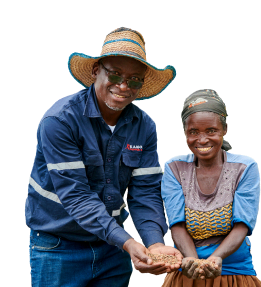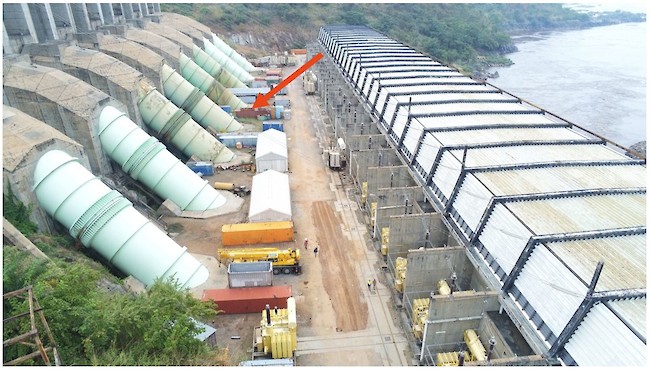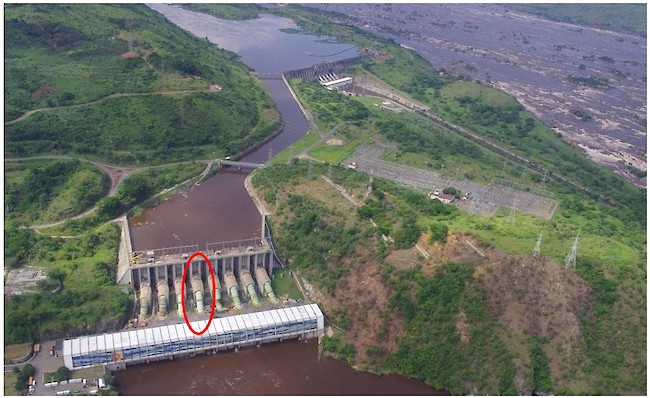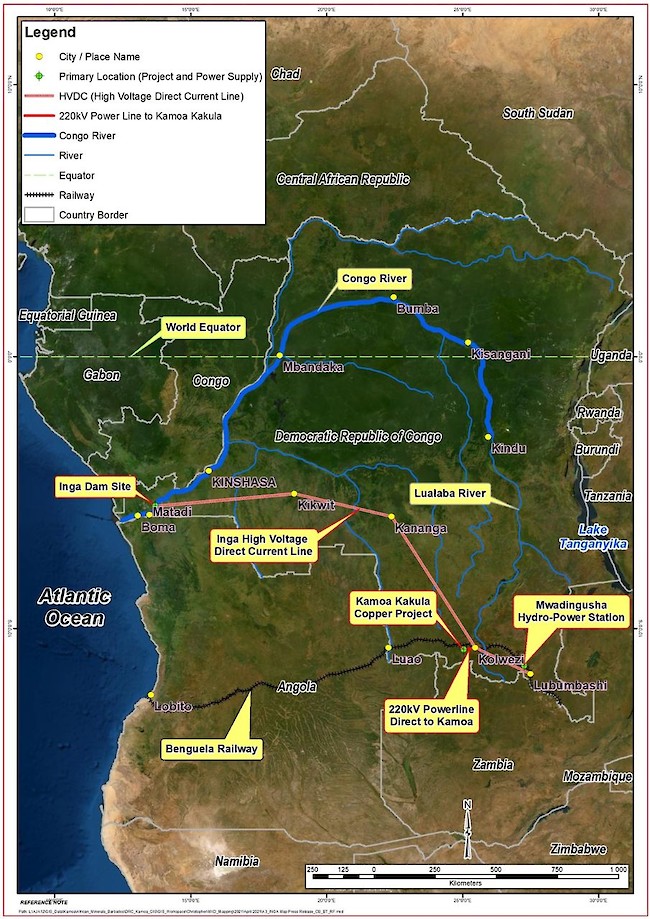Turbine 5 to produce 162 MW of renewable hydropower, providing the Kamoa-Kakula Copper Complex and associated smelter with sustainable electricity for Phase 3 and future expansions
Combined 240 MW output from the Mwadingusha and Inga II hydropower plants also will benefit local communities
KINSHASA, DEMOCRATIC REPUBLIC OF CONGO – Ivanhoe Mines (TSX: IVN; OTCQX: IVPAF) Co-Chairs Robert Friedland and Yufeng “Miles” Sun are pleased to announce that Ivanhoe Mines Energy DRC – a sister company of Kamoa Copper SA tasked with delivering reliable, clean, renewable hydropower to the Kamoa-Kakula Copper Mine – has extended its existing financing agreement under a public-private partnership with the Democratic Republic of Congo’s state-owned power company, La Société Nationale d’ Électricité (SNEL), to upgrade turbine 5, a major turbine in the existing Inga II hydropower facility on the Congo River.
The extension of this financing agreement builds on the framework agreed in the memorandum of understanding signed with SNEL and announced in April 2021.
An estimated 162 megawatts (MW) of hydropower is expected to be generated by upgrading Inga II’s turbine 5, which when combined with the 78 MW of hydropower from the Mwadingusha facility, will give Kamoa-Kakula priority access to a combined 240 MW of clean, renewable electricity.
The financing agreement was originally entered into in connection with the joint rehabilitation of the Mwadingusha hydropower plant under the first public-private partnership with SNEL, where five of six turbines now have been completed. Under this financial arrangement, rehabilitation and upgrade activities are financed by Kamoa Copper’s holding company, Kamoa Holding, by way of a loan to SNEL, which will be repaid through a deduction to monthly power bills incurred over the life of the loan.
Kamoa Copper and SNEL, together with the expertise of Stucky SA of Lausanne, Switzerland, and Voith Hydro of Heidenheim, Germany, respectively the EPCM and the contractor, have commenced a technical assessment to define the scope of work and associated costs estimate. The work also will include upgrading of the terminal equipment on the Inga-Kolwezi transmission line to increase its transfer capacity by a minimum of 200 MW.
Mr. Friedland commented: “The Kamoa Copper management team continues to execute on our strategic plan to systematically expand Kamoa-Kakula into one of the world’s largest and greenest copper producers. The timely refurbishment of turbine 5 at the Inga II hydropower complex is instrumental in ensuring we meet the aggressive expansion goals we’ve set out to accomplish in the next few years.”
SNEL CEO Jean-Bosco Kayombo Kayan added: “SNEL and Ivanhoe Mines Energy are confident that the Inga II project will enjoy the same success as our joint rehabilitation of the Mwadingusha hydroelectric power station. We all are keen on fast-tracking the return to service of unit 5 at Inga II to provide access to electricity to more people in the Democratic Republic of Congo, and to meet the power demands of the world-scale Kamoa-Kakula Copper Mine.”
Estimated 162 MW of hydropower expected to be generated by Inga II turbine 5 upgrade
The Inga II hydropower plant is located in the southwest of the DRC, on the Congo River. The Congo River is the deepest river in the world and the second longest after the Nile, with a flow rate second only to the Amazon River. Measured along with the Lualaba, the main tributary, the Congo River has a total length of 4,370 kilometres. It is the only major river to cross the equator twice. The Congo River is unique in that it has large rapids and waterfalls very close to the mouth, while most rivers have these features upstream. The rapids and waterfalls give the Congo River huge hydropower potential. The Congo Basin covers an estimated total area of 3.7 million square kilometres, approximately 13% of the entire African landmass.
Originally equipped between 1977 and 1982, Inga II has been running for approximately 40 years. Four of the eight turbines at Inga II have beenrefurbished. Turbine 5 is one of the remaining four turbines that are awaiting an upgrade. An estimated output of 162 MW is expected to be unlocked by upgrading Inga II’s turbine 5, part of which will be used to meet future power requirements of the Kamoa-Kakula Mine. The surplus power produced from the upgraded turbine will be distributed on the national power grid to increase access to electricity for the citizens of the Democratic Republic of Congo.
SNEL and Ivanhoe Mines Energy DRC have appointed Voith Hydro, a leading engineering group, as the contractor to lead the consortium of equipment manufacturers for the turbine upgrade. For more than 80 years, Voith has successfully constructed and modernized hydropower plants on the African continent, and approximately 25% of currently installed turbine capacity in Africa has been supplied by Voith. The company also has successfully rehabilitated two turbine generators at the adjoining Inga I hydropower plant, a project that was financed by the World Bank.
The Kamoa-Kakula Copper Project is a joint venture between Ivanhoe Mines (39.6%), Zijin Mining Group (39.6%), Crystal River Global Limited (0.8%) and the Government of the Democratic Republic of Congo (20%).
The Inga II dam wall and penstocks, with turbine 5 indicated by the red arrow.
Aerial view of the Inga I (rear) and Inga II (front) hydropower plants on the Congo River. The penstock funneling water to turbine 5 at Inga II is circled in red.
The map below shows the Inga and Mwadingusha hydropower complexes, the 1,700-kilometre Inga-Kolwezi high-voltage direct current power line, the Kamoa-Kakula Project, the new 220-kilovolt power line connecting Kamoa-Kakula to the national grid at Kolwezi, and the Benguela railway connecting the DRC to the Angolan port of Lobito.
About Ivanhoe Mines
Ivanhoe Mines is a Canadian mining company focused on advancing its three principal joint-venture projects in Southern Africa: the development of major new, mechanized, underground mines at the Kamoa-Kakula copper discoveries in the DRC and at the Platreef palladium-platinum-nickel-copper-rhodium-gold discovery in South Africa; and the extensive redevelopment and upgrading of the historic Kipushi zinc-copper-germanium-silver mine, also in the DRC.
Kamoa-Kakula began producing copper in May 2021 and, through phased expansions, is positioned to become one of the world’s largest copper producers. Kamoa-Kakula and Kipushi will be powered by clean, renewable hydro-generated electricity and will be among the world’s lowest greenhouse gas emitters per unit of metal produced. Ivanhoe also is exploring for new copper discoveries on its Western Foreland exploration licences in the DRC, near the Kamoa-Kakula Project.
Information contacts
Investors: Bill Trenaman +1.604.331.9834 / Media: Matthew Keevil +1.604.558.1034
Forward-looking statements
Certain statements in this release constitute “forward-looking statements” or “forward-looking information” within the meaning of applicable securities laws. Such statements and information involve known and unknown risks, uncertainties and other factors that may cause the actual results, performance or achievements of the company, its projects, or industry results, to be materially different from any future results, performance or achievements expressed or implied by such forward-looking statements or information. Such statements can be identified by the use of words such as “may”, “would”, “could”, “will”, “intend”, “expect”, “believe”, “plan”, “anticipate”, “estimate”, “scheduled”, “forecast”, “predict” and other similar terminology, or state that certain actions, events or results “may”, “could”, “would”, “might” or “will” be taken, occur or be achieved. These statements reflect the company’s current expectations regarding future events, performance and results and speak only as of the date of this release.
Such statements include without limitation, the timing and results of: (i) statements regarding an estimated 162 megawatts (MW) of hydropower is expected to be generated by upgrading Inga II’s turbine 5, which when combined with the 78 MW of hydropower from the Mwadingusha facility, will give Kamoa-Kakula priority access to a combined 240 MW of clean, renewable electricity; and (ii) statements regarding Kamoa-Kakula and Kipushi will be powered by clean, renewable hydro-generated electricity and will be among the world’s lowest greenhouse gas emitters per unit of metal produced.
Forward-looking statements and information involve significant risks and uncertainties, should not be read as guarantees of future performance or results and will not necessarily be accurate indicators of whether or not such results will be achieved. A number of factors could cause actual results to differ materially from the results discussed in the forward-looking statements or information, including, but not limited to, the factors discussed below and under “Risk Factors”, and elsewhere in this release, as well as unexpected changes in laws, rules or regulations, or their enforcement by applicable authorities; the failure of parties to contracts with the company to perform as agreed; social or labour unrest; changes in commodity prices; and the failure of exploration programs or studies to deliver anticipated results or results that would justify and support continued exploration, studies, development or operations.
Although the forward-looking statements contained in this release are based upon what management of the company believes are reasonable assumptions, the company cannot assure investors that actual results will be consistent with these forward-looking statements. These forward-looking statements are made as of the date of this release and are expressly qualified in their entirety by this cautionary statement. Subject to applicable securities laws, the company does not assume any obligation to update or revise the forward-looking statements contained herein to reflect events or circumstances occurring after the date of this release.
The company’s actual results could differ materially from those anticipated in these forward-looking statements as a result of the factors set forth below in the “Risk Factors” section in the company’s 2021 Q2 MD&A and its current annual information form.



 English
English Français
Français 日本語
日本語 中文
中文

